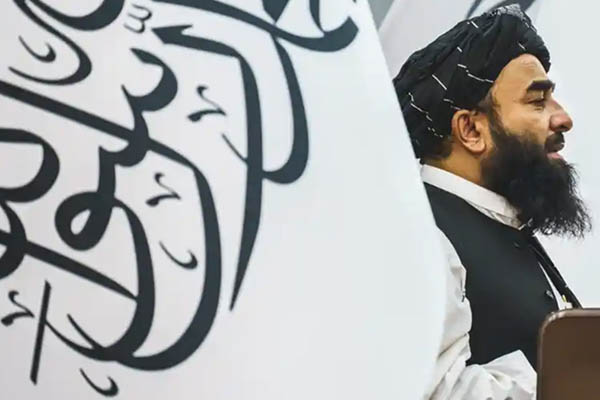
Taliban spokesman Zabihullah Mujahid stands with the flag of the Islamic Emirate
The Taliban should be allowed to enact the reforms they have promised before the world leaps to isolate them over perceived deficiencies
On his deathbed, the first Mughal king Zaheeruddin Babur had one last wish: that his remains be buried in a garden at Kabul. A king who grew up in Central Asia (now Uzbekistan) and ended with a vast empire in the plains of India, his heart was forever captivated by the weather, fruits and natural splendor of a city that is now the capital of Afghanistan.
Cut to 2021—nearly 500 years later—and Kabul is in the grip of chaos and on the precipice of falling into further bloodshed.
This in summary is the legacy of the Allied (read: American) invasion in 2001. 20 years. Hundreds of thousands dead, mainly civilians. Many more with long-lasting physical and psychological injuries. Plus a cache of sophisticated weaponry with serious chances of falling into the wrong hands.
I do not seek to dissect the U.S. action—this will happen in the coming days, months, years and even decades.
What is more important is to discuss where we go from here.
I have been an impassioned advocate for women in Pakistan for over 40 years. The Pakistani and Afghan cultures have more similarities than differences, including religion, ethnicity (a large Pashtun population on both sides) and a long shared history. So I speak from experience.
I found the Taliban regime of the 1990s to be abhorrent in many respects, including barbaric violence and treatment of women. However, it was no more abhorrent and immoral than the so-called ‘war on terror’—a license to mass slaughter under the pretense of humane intervention.
I ask: where were all these advocates of women’s rights when the allied troops bombed wedding parties and schools killing dozens, mainly women and children? This gimmickry and obfuscation should not fool us anymore.
The Taliban 2.0 have come with the plan and, at the time of writing, have been consistent with it. Thus far, they have remarkably avoided bloodshed with some adroit political maneuvering.
We should be in no doubt that Kabul alone, where most western media is based, does not reflect the value systems of the broader country. In a society beset with tribalism, regionalism and sectarianism, only a homegrown solution will work. No matter how well-intentioned the outside intervention.
The international community now needs to acknowledge that a massive genocidal crime against humanity has been conducted against the Afghans since 1980. It is time to set things right. As a first step, the Taliban government should be supported both financially and technically. They certainly don’t need more funds for arms, as more than enough have been ‘gifted’ by the botched U.S. exit under President Joe Biden. Rather, what is now required is the role of benevolent overseer.
The global community must ensure the Taliban toe the lines on the basic tenets of human rights—but at the same time it must give the group space to correct things when they go wrong. And there will certainly be times when they go wrong but this should not stand in the way of progress; let us not forget that it was only during the Taliban rule we saw a precipitous drop in poppy production of Afghanistan.
It must also be recalled that the Afghanistan of today is significantly different from that of the 1990s. Nearly two thirds of the Afghan population is less than 24 years old, with little recollection of the previous Taliban rule. Theirs is a life of mobile phones, social media and connectivity with the rest of the world. The Taliban will have to take this factor into account, and it seems they already are, relaxing measures regarding women at work and in public spaces.
As we have seen in Pakistan, and lately in Saudi Arabia, lasting change comes from within a society and not without. It certainly does not come by enforcing flawed moral or cultural standards of an alien culture onto a society with its own cultural mores and requirements.
I fully support the Government of Pakistan’s initiative to let the Afghans decide their own fate and to move away from the harmful meddling of the 90s. Others should do the same.
As the ill-fated American adventure comes to an end, we mourn the loss of nearly 200 innocent souls—the majority trying to flee the country ahead of a new Taliban government—at Kabul Airport. This included 13 U.S. servicemen, most of them too young to even remember the events of 9/11, the reason they died in vain. It is ironic that this attack was perpetrated by a terrorist group that did not exist when this ‘war on terror’ was launched with an aim to eradicate terror globally.
I started with Babur and will end it by remembering my first visit to Kabul in 1971, the free-wheeling city of gardens and hospitable people. As Babur wrote in his seminal Baburnama:
Drink wine in the castle of Kabul and send the cup round to entertain
For Kabul is mountain, is river, is city, and is also a plain.
Dedicated to the innocent and long-suffering nation of Afghanistan.
Ali is a PTI parliamentarian in the Punjab Assembly, with more than 40 years of experience in women’s issues in Pakistan.
The opinions expressed in this article are the author’s own and do not necessarily reflect, in part or whole, those held by Newsweek Pakistan.
